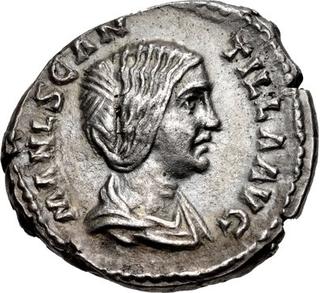
Marcus Didius Julianus was Roman emperor from March to June 193, during the Year of the Five Emperors. Julianus had a promising political career, governing several provinces, including Dalmatia and Germania Inferior, and defeated the Chauci and Chatti, two invading Germanic tribes. He was even appointed to the consulship in 175 along with Pertinax as a reward, before being demoted by Commodus. After this demotion, his early, promising political career languished.

The gens Petronia was a plebeian family at ancient Rome. This gens claimed an ancient lineage, as a Petronius Sabinus is mentioned in the time of Lucius Tarquinius Superbus, the last of the Roman kings, but few Petronii are mentioned in the time of the Republic. They are frequently encountered under the Empire, holding numerous consulships, and eventually obtaining the Empire itself during the brief reign of Petronius Maximus in AD 455.

The gens Aquillia or Aquilia was a plebeian family of great antiquity at ancient Rome. Two of the Aquillii are mentioned among the Roman nobles who conspired to bring back the Tarquins, and a member of the house, Gaius Aquillius Tuscus, was consul in 487 BC.
Titus Didius was a politician and general of the Roman Republic. In 98 BC he became the first member of his family to be consul. He is credited with the restoration of the Villa Publica, and for his command in Hispania Citerior. He held two Triumphs, one for his victories over the Scordisci, another for his victories in Spain.

Manlia Scantilla was a Roman woman who lived in the second century. She was very briefly Roman Empress as wife to the Roman Emperor Didius Julianus. Her name indicates that she was born into the gens Manlia, which if correct, indicates an illustrious patrician ancestry.

Didia Clara was a daughter and the only recorded child to the Roman Emperor Didius Julianus and Empress Manlia Scantilla. She was born and raised in Rome. Little is known about her personality or life.
Cornelius Repentinus was a Roman Senator who was active in the 2nd century AD. He held a number of positions during the reigns of emperors Marcus Aurelius, Commodus and Didius Julianus, which included suffect consul and Urban prefect of Rome.

The gens Didia, or Deidia, as the name is spelled on coins, was a plebeian family at ancient Rome, which first appears in history during the final century of the Republic. According to Cicero, they were novi homines. Titus Didius obtained the consulship in 98 BC, a dignity shared by no other Didii until imperial times.
Publius Septimius Geta was the father of the emperor Lucius Septimius Severus, father-in-law of the Roman empress Julia Domna and the paternal grandfather of the Roman emperors Caracalla and Geta. Besides mentions in the Historia Augusta, Geta is known from several inscriptions, two of which were found in Leptis Magna, Africa.
Quintus Aemilius Laetus was a prefect of the Roman imperial bodyguard, known as the Praetorian Guard, from 191 until his death in 193. He acceded to this position upon the deaths of his predecessors Regillus and Lucius Julius Vehilius Gratus Julianus, by appointment of emperor Commodus. His name suggests that his family received Roman citizenship from Marcus Aemilius Lepidus.
The gens Vitellia was a family of ancient Rome, which rose from obscurity in imperial times, and briefly held the Empire itself in AD 69. The first of this gens to obtain the consulship was Aulus Vitellius, uncle of the emperor Vitellius, in AD 32.
The gens Anicia was a plebeian family at ancient Rome, mentioned first towards the end of the fourth century BC. The first of the Anicii to achieve prominence under the Republic was Lucius Anicius Gallus, who conducted the war against the Illyrians during the Third Macedonian War, in 168 BC.
Tiberius Claudius Severus Proculus was a Roman Senator. Via his mother he was a grandson of Emperor Marcus Aurelius, but he played only a limited role in dynastic politics.
The gens Ceionia or gens Caeionia or the Caeionii family was an ancient Roman senatorial family of imperial times. The first member of the gens to obtain the consulship was Lucius Ceionius Commodus in AD 78. The rise of this family culminated in the elevation of the emperor Lucius Verus, born Lucius Ceionius Commodus, in AD 161.
Marcus Silius Messala was a Roman senator and suffect consul towards the end of the 2nd century. In 193, Messala was the suffect consul from May until June. He was in command of the location where the murder of Pertinax took place. Septimius Severus accused Messala of murdering Pertinax and using his influence to convene and order the Senate to install the Senator Didius Julianus as Emperor. Septimius Severus called the death of Didius Julianus divine providence and ordered the execution of Messala.
Marcus Nummius Umbrius Primus Senecio Albinus was a Roman senator who was appointed consul in AD 206 with Lucius Fulvius Gavius Numisius Petronius Aemilianus as his colleague.
Titus Flavius Claudius Sulpicianus was a Roman statesman who served as Senator and Consul suffectus. He unsuccessfully attempted to succeed his son-in-law Pertinax as Emperor in 193.
The gens Nummia was a plebeian family at ancient Rome. Members of this gens appear almost exclusively under the Empire. During the third century, they frequently obtained the highest offices of the Roman state.





